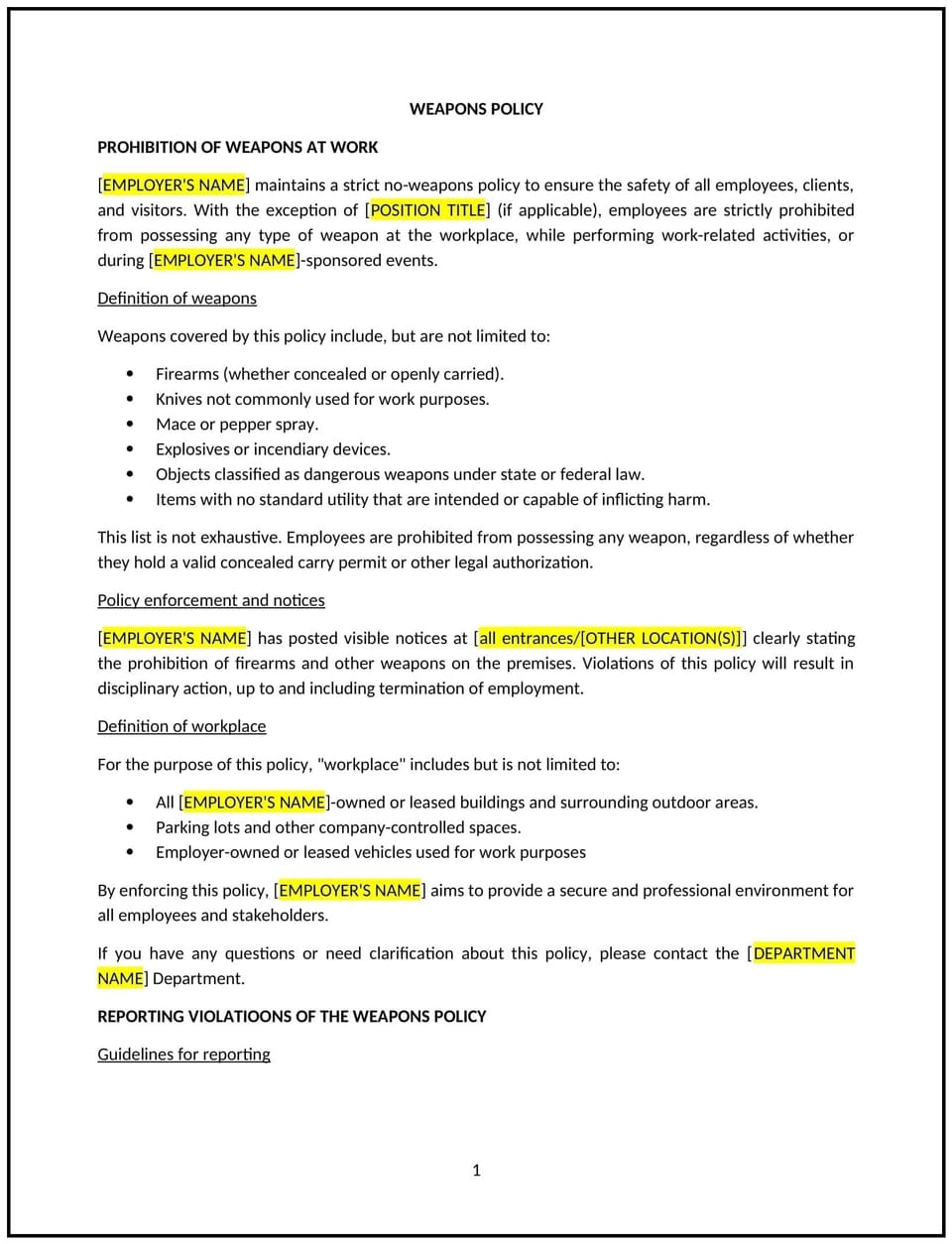Weapons policy (Louisiana): Free template

Weapons policy (Louisiana)
This weapons policy is designed to help Louisiana businesses establish a safe and secure work environment by prohibiting the possession, use, or display of weapons on company property. It outlines expectations, prohibited items, and procedures for addressing violations.
By implementing this policy, businesses can reduce risks, promote safety, and support a peaceful workplace culture.
How to use this weapons policy (Louisiana)
- Define prohibited weapons: Clearly specify which items are considered weapons, including firearms, knives, explosives, and other dangerous objects.
- Outline prohibited areas: Specify where weapons are not allowed, such as offices, company vehicles, and worksites.
- Communicate exceptions: Clarify any exceptions, such as authorized security personnel or employees with legal permits under specific circumstances.
- Include reporting procedures: Provide steps for employees to report concerns about weapons in the workplace.
- Address consequences: Specify the disciplinary actions for violating the policy, such as warnings, suspension, or termination.
- Emphasize safety measures: Highlight proactive measures to maintain a secure workplace, such as security checks or awareness training.
Benefits of using a weapons policy (Louisiana)
Implementing this policy provides several advantages for Louisiana businesses:
- Promotes safety: Minimizes risks of accidents or violence involving weapons.
- Reduces liability: Protects the business by clearly communicating rules and expectations regarding weapons.
- Encourages reporting: Provides a safe mechanism for employees to report concerns about weapons in the workplace.
- Establishes consistency: Applies clear and uniform rules across the organization.
- Reflects Louisiana-specific considerations: Adapts to local regulations and cultural norms regarding weapons.
Tips for using this weapons policy (Louisiana)
- Communicate clearly: Ensure employees are aware of the policy during onboarding and provide reminders when necessary.
- Train staff: Offer training on recognizing and addressing potential threats related to weapons.
- Monitor access: Implement measures such as access controls or security checks to prevent unauthorized items on company property.
- Document incidents: Maintain detailed records of reported violations and follow-up actions to ensure transparency.
- Update regularly: Revise the policy to reflect changes in workplace practices or Louisiana-specific requirements.
Q: What items are considered weapons under this policy?
A: Weapons include firearms, knives (other than small utility tools), explosives, and any other objects designed or used to cause harm.
Q: Where are weapons prohibited under this policy?
A: Weapons are prohibited in offices, company vehicles, worksites, and other areas under the company’s control.
Q: Are there any exceptions to this policy?
A: Exceptions may apply to authorized security personnel or employees with specific legal permits, as outlined in the policy.
Q: What should employees do if they see a weapon in the workplace?
A: Employees should report the incident immediately to their manager, HR, or security personnel, following the policy’s reporting procedures.
Q: What actions will be taken if someone violates this policy?
A: Violations may result in disciplinary action, including warnings, suspension, or termination, depending on the severity of the incident.
Q: How often should this policy be reviewed?
A: The policy should be reviewed annually or when changes occur in workplace practices or Louisiana-specific requirements.
Q: How can businesses ensure workplace safety regarding weapons?
A: Businesses can implement access controls, conduct regular safety training, and encourage a culture of awareness and reporting.
This article contains general legal information and does not contain legal advice. Cobrief is not a law firm or a substitute for an attorney or law firm. The law is complex and changes often. For legal advice, please ask a lawyer.


